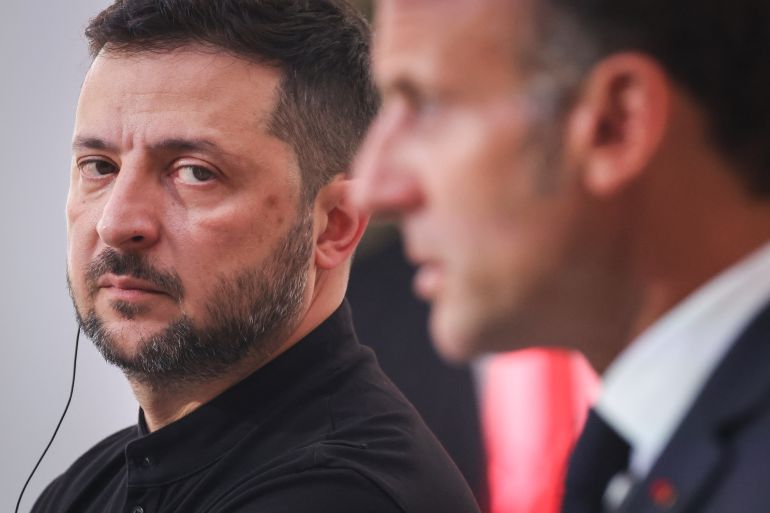Macron hopeful of US support to Kyiv’s security as 26 nations pledge troops
Twenty-six countries pledge to send troops to Ukraine after fighting stops, though Russia’s President Putin shows no signs he is ready to end war.

Published On 4 Sep 20254 Sep 2025
French President Emmanuel Macron has said that there is “no doubt” the United States will support security efforts in Ukraine after 26 European countries pledged to send troops to the war-battered country after fighting ends.
Macron spoke after a meeting of the so-called coalition of the willing in Paris on Thursday that was followed by a video call to United States President Donald Trump aiming to get a clearer sense of Washington’s commitment to Ukrainian security, viewed as essential to any peacekeeping efforts.
Recommended Stories
list of 3 itemsend of list
The French president said that US support for the “reassurance force” would be finalised “in the coming days” and that Washington would collaborate with European countries in imposing new sanctions if Russia were to continue to refuse a deal to end the three-and-a-half-year war.
The summit in Paris included European leaders, with Ukrainian President Volodymyr Zelenskyy and Trump’s special envoy Steve Witkoff in attendance, and was part of a push to show Europe’s ability to act independently after mixed signals from Washington since Trump entered office in January.
Reporting from Paris, Al Jazeera’s Natacha Butler said that Macron had indicated the call with Trump was “positive”, with further news to come on what the US might have to offer in terms of security guarantees.
“Until now, that has been very vague indeed,” she said, noting that Trump had previously said that US troops would not be sent to Ukraine.
Experts say that any European operation would hinge on the US providing intelligence support and airpower in countries outside Ukraine.
‘Concrete step’
The guarantees by the 26 countries in the coalition of the willing – largely European, with the inclusion of Canada, Australia and Japan – are expected to include ramped-up training for the Ukrainian army and deployment of troops by some European states.
Advertisement
“We have today 26 countries who have formally committed … to deploy as ‘reassurance force’ troops in Ukraine, or be present on the ground, in the sea, or in the air,” Macron said alongside Zelenskyy.
He specified that troops would not be deployed “on the front line” and would aim to “prevent any new major aggression”.
Zelensky hailed the move: “I think that today, for the first time in a long time, this is the first such serious concrete step,” he said.
During the summit, United Kingdom Prime Minister Keir Starmer said it was necessary “to go even further to apply pressure on Putin to secure a cessation of hostilities”, a Downing Street spokeswoman said.
German Chancellor Friedrich Merz also urged more pressure, but remained cautious about the scope of involvement.
“Germany will decide on military involvement at the appropriate time once the framework conditions have been clarified,” a government spokesman said after the summit.
Italian Prime Minister Giorgia Meloni’s office said her country would not send troops to Ukraine, but it could help monitor any potential peace deal.
Peace talks stall
Countries met to discuss Ukraine’s security amid growing concern that Russian President Vladimir Putin is currently showing no interest in a peace accord, with alarm intensifying after his high-profile visit to Beijing this week.
Al Jazeera’s Butler said that while Zelenskyy was “very pleased that things seemed to be moving forward”, he had said Putin had “no intention of coming to the table for any form of peace talks”.
Putin had earlier said he would be willing to meet Zelenskyy in Moscow, a call that many viewed as a call for capitulation.
Trump, who has not yet managed to broker talks between Zelenskyy and Putin, warned this week that the Russian leader would “see things happen” if he was unhappy with Moscow’s next steps.
Putin has said Moscow is willing to “resolve all our tasks militarily” in the absence of a peace deal acceptable to the Kremlin. He has also indicated he does not want to see European troops in post-war Ukraine,
“It’s not for them to decide,” NATO chief Mark Rutte shot back Thursday. “I think we really have to stop making Putin too powerful.”
Trump ‘dissatisfied’
Following the video call with Trump, Zelenskyy said the US president was “very dissatisfied” that European countries were still buying Russian oil, pointing the finger specifically at “Hungary and Slovakia”.
The European Union imposed a ban on most oil imports from Russia in 2022, but it made an exception for imports to Slovakia and Hungary to give the landlocked central European countries time to find alternative oil supplies.
Advertisement
Ukraine has targeted Russia’s Druzhba oil pipeline, which carries Russian oil to Slovakia and Hungary, throughout the conflict. Both nations have asked the European Commission to act against Ukraine’s attacks.
A White House official cited by news agency Reuters confirmed that Trump had “emphasised” that European countries must stop purchasing Russian oil, adding that Russia received 1.1 billion euros ($1.28bn) in fuel sales from the EU in one year.
“The president also emphasised that European leaders must place economic pressure on China for funding Russia’s war efforts,” the official said.
The European Commission has proposed legislation to phase out EU imports of Russian oil and gas by January 1, 2028.
The Trump administration has also imposed tariffs on India for buying Russian oil in efforts to pressure the Kremlin to end the war. But the US has been accused of double standards for sparing China – the largest buyer of Russian crude.
